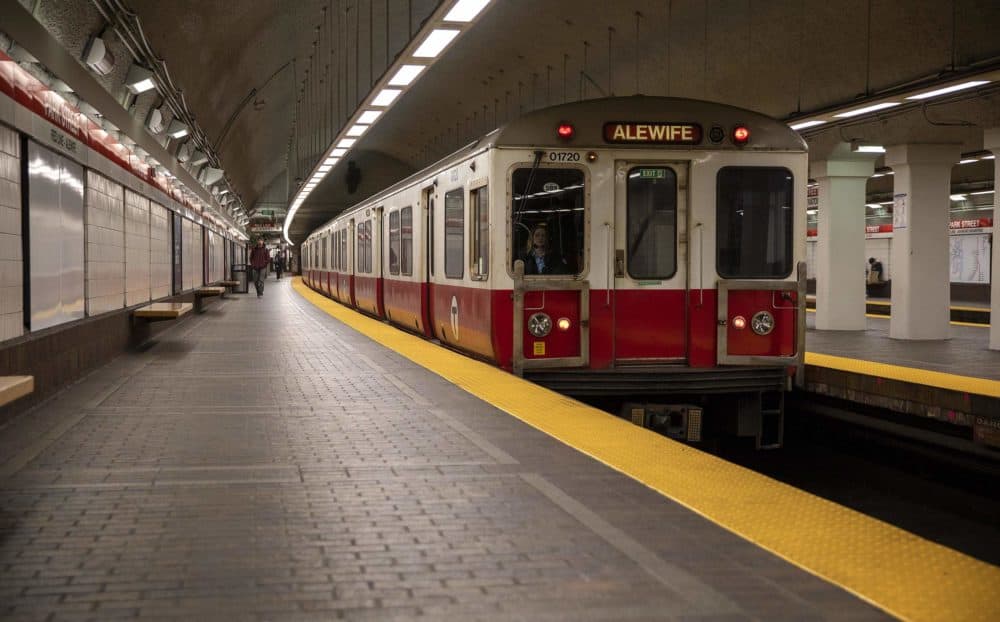Advertisement
MBTA outlines far-reaching $500M spending plan

Buoyed by an injection of federal relief funds during the pandemic, the MBTA will redirect half a billion dollars toward major safety investments, electric bus infrastructure, workforce retention efforts and matching grant programs.
MBTA General Manager Steve Poftak on Thursday outlined a plan to spend $500 million on a suite of capital investments, pitching it as a way to target important behind-the-scenes improvements at a time when one-time dollars have created new flexibility for a transit agency that stares down budget gaps year after year.
"If you're out on the system, visually, you know there's a number of additional investments that we need to make," Poftak said. "We also know that we are facing a shortage of capital funds that is particularly acute in the middle of the upcoming decade."
Poftak and his team plan to deploy the funding in the coming months, and while the agency's board of directors did not need to approve it with a formal vote, its members signaled they are fully on board.
All of the money set to be reallocated comes from the T's traditional revenue streams like fares and advertising. Officials feel empowered to rethink their spending approach after a trio of federal emergency relief laws collectively steered nearly $2 billion to the MBTA, money that closed operating budget gaps ripped open by the COVID-19 pandemic and ensuing plummet in fare revenue.
Poftak said the agency will still have enough money from Washington on hand to keep its budget balanced through fiscal year 2023.
"These are all one-time expenses that do not impact the future budget of the T, nor do they rule out some flexibility in the future," he said.
About $67 million would go toward programs and features aimed at improving safety across the system, including money to deploy anti-collision technology on the Green Line one year earlier than planned.
The move would bring the Green Line Train Protection Project online by 2023, more than a decade after a pair of crashes in 2008 and 2009 initially prompted the Federal Transit Administration to recommend its use by the T.
Poftak said the new system would help avoid incidents like a July 30 crash when a trolley traveling three times the speed limit smashed into another trolley from behind, injuring 27 riders.
The driver in that case, Owen Turner, faces charges for negligence of a person having care of public conveyance and gross negligence in management of a train, and the Suffolk County District Attorney's office is also investigating.
Advertisement
Poftak's plan would also steer $109 million to accelerate bus improvements with a specific focus on converting the fleet from diesel and hybrid to electric vehicles. The move would provide "necessary funding" to begin construction of a bus maintenance facility in Quincy, poised to become the first all-electric bus center in the T's system, as well as design of an Arborway garage.
Another $70 million would advance the design and construction of projects like a new commuter rail station in Newton, while $89 million more would flow into existing capital programs such as implementation of anti-collision technology on commuter rail trains.
The shift additionally would make $20 million available to offer new hires one-time bonuses and provide retention bonuses to existing T employees, efforts to address driver shortages that have created headaches and service cuts in recent months.
The final chunk of the plan will set aside $145 million to prepare for an influx of federal money under the new infrastructure law set to steer billions to Massachusetts. Poftak said that money will help the T have matching dollars on hand to compete for grants and maximize formula funds.
MBTA Board member Thomas Koch, who also serves as mayor of Quincy, told Poftak he "absolutely support(s) every aspect of this plan."
Fellow board member Travis McCready added that zeroing in on capital spending — which covers maintenance, modernization and expansions — "is not an esoteric use of funds."
"They do have direct and very important impacts on our riders, their safety and the efficacy of the overall system," he said. "It's important that this conversation be very up front and clear about what those impacts are."
In 2019, MBTA officials estimated that it would cost $10.1 billion to replace all outdated equipment and infrastructure across the system.
While it often faces budget gaps on the operating side, the MBTA has increased its capital spending significantly during the Baker administration, reaching $1.9 billion in FY2021.
Dark clouds continue to loom on the horizon, though, as legislative leaders show virtually no interest in tackling long-term funding questions at the T.
Warning of an impending "fiscal calamity," the Massachusetts Taxpayers Foundation in September estimated the agency will need as much as $1.25 billion in new annual revenue to meet its operating and capital needs just a few years from now.